Labexchange -
Die Laborgerätebörse GmbH
Bruckstr. 58
72393 Burladingen / GERMANY
Tel. +49-7475-9514-0
Fax +49-7475-9514-44
E-Mail: info@labexchange.com
Go to inquiry form
Labexchange -
Die Laborgerätebörse GmbH
Bruckstr. 58
72393 Burladingen / GERMANY
Tel. +49-7475-9514-0
Fax +49-7475-9514-44
E-Mail: info@labexchange.com
Go to inquiry form
Labexchange -
Die Laborgerätebörse GmbH
Bruckstr. 58
72393 Burladingen / GERMANY
Tel. +49-7475-9514-0
Fax +49-7475-9514-44
E-Mail: info@labexchange.com
Go to inquiry form

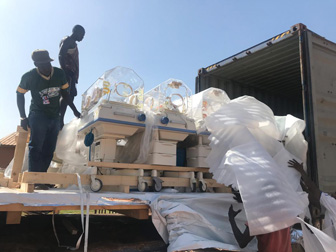
April 2020
The Labexchange Foundation donated several laboratory devices with a value of 3,120 euros to a hospital in Gambia.
Dr. Antonie Bäuerle, internist and member of the working group Integration Frickenhausen, is part of an 8-member project group that has set itself the goal of improving health care in Gambia.
With the help of a grant from the county of Esslingen (Sparkasse) the team succeeded in organizing the shipment of a 40 foot container. The container will be loaded with various medical and analytical equipment. Labexchange participated in this project with a PCR Techne-TC-3000G, an Eppendorf Mastercycler personal, a Siemens freezer, a shaker and a GFL water bath.
It all began after a memorable stay in hospital in Gambia, whereupon Dr. Bäuerle began collecting urgently needed medical and laboratory equipment.
She has travelled repeatedly to West Africa for several years. Together with various representatives of working groups from the Esslingen county she visited Gambia for the first time in 2017. When a member of the group fell ill, they went to a state Gambian hospital. "This visit was completely unplanned and it was immediately obvious that everything was missing there: buildings, medication, functioning equipment and personnel," reported Dr. Bäuerle.
Back in Germany, this hospital stay kept the group busy for a long time. They began to collect donations. In the beginning they sent various dressing materials and small medical equipment to Gambia. A Gambian refugee living in Frickenhausen established contact with a hospital employee and a medical technician on site. With great joy of the colleagues and sisters in Gambia, donations of a discarded ultrasound device (3 transducers), an oxygen concentrator (new), FC measuring devices and various dressing materials followed. Everything, down to the last patch, arrived at its destination with the help of the two contacts at the destination.
Dr. Bäuerle now wants to continue this success story by shipping the loaded 40-foot container. Such projects are especially dear to the Labexchange Foundation, which is why the founder of the foundation, Dr. Wolfgang Kuster, did not hesitate for a second to get involved.
Labexchange wishes Dr. Bäuerle and her team the very best for her project.
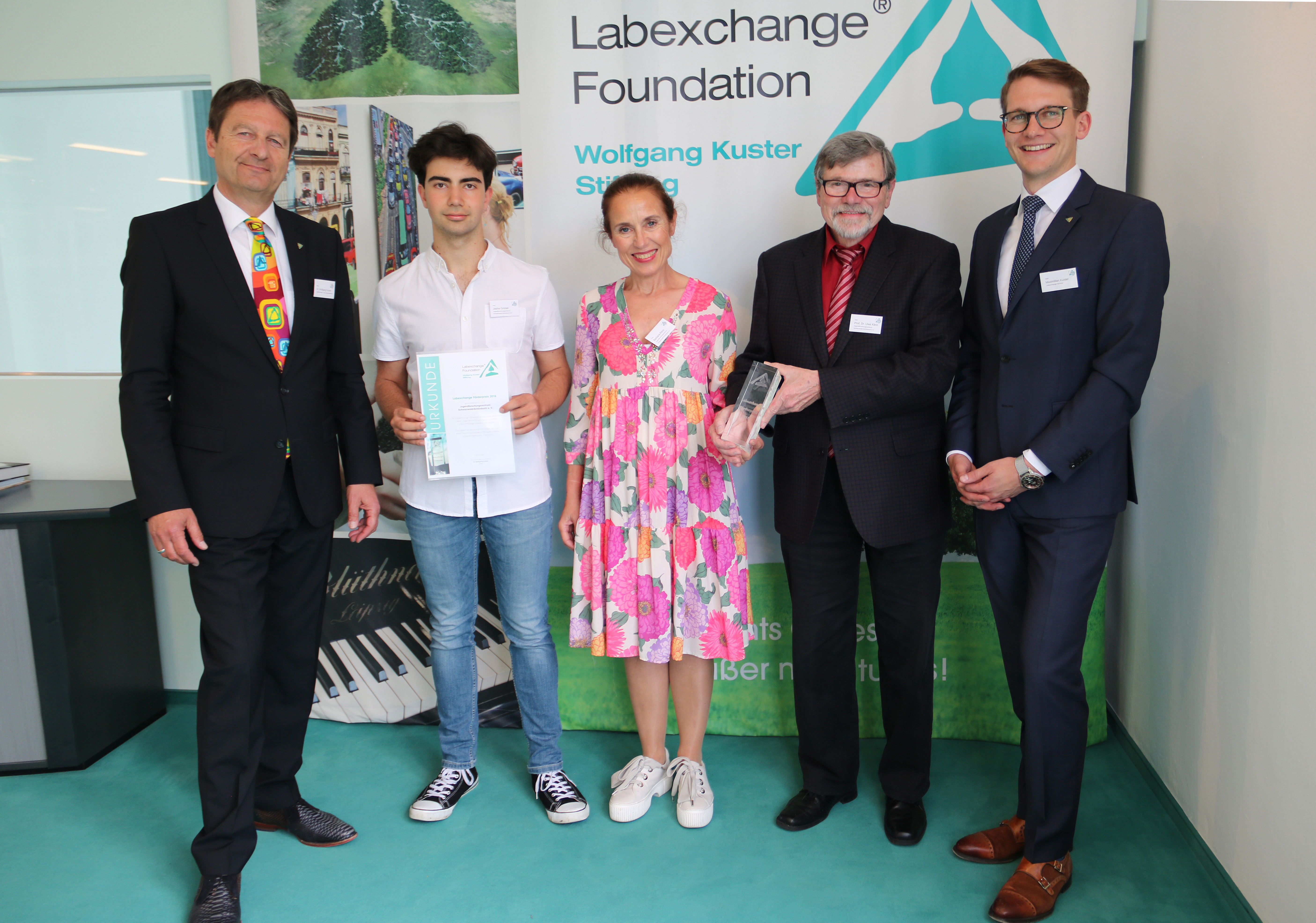
During the celebration of the 30th company anniversary of the Labexchange on 24 May, the Youth Research Centre Schwarzwald Schönbuch e.V. received the Labexchange Advancement Award 2018.
Last Friday Labexchange celebrated its 30th company anniversary in a successful festive ceremony. As a special item on the programme, Managing Director Dr. Wolfgang Kuster awarded the Labexchange Advancement Award to the Youth Research Centre Schwarzwald Schönbuch e.V., represented by its Managing Director Mrs. Barbara Renz, its Head Professor Dr. Uwe Klein and young researcher Jasha Grüner from Nagold who had come to Burladingen for the celebration. The Labexchange Advancement Award recognizes the research centre's valuable service in getting young people excited about natural sciences and sustainable projects. The Labexchange Foundation supports with this award the purchase of a Thermo Nicolet Nexus FTIR spectrometer with a sum of 3,000.00 €.
The occasion to support the Youth Research Centre in Nagold was given by young researcher Jasha Grüner and his project about "Plastic to Diesel". The invited guests of honour were noticeably impressed when the 16-year-old presented his project. He was able to produce diesel fuel from plastic. This type of fuel is liquid and therefore releases fewer pollutants during combustion. It is also more efficient than burning plastic. Mr. Grüner then hydrogenated the plastic diesel and was able to obtain more combustible compounds. This optimisation means that the plastic fuel can now be used in a diesel engine.
After receiving appreciative applause for this amazing achievement, Mrs. Renz and Professor Klein warmly thanked Dr. Kuster. Previously, the Youth Research Centre had also acquired laboratory equipment from Labexchange. For an institution that is financed by donations and has less money at its disposal, urgently needed investments would not be possible without a company like Labexchange. According to Professor Klein, Labexchange makes a significant contribution by selling used and thus affordable laboratory and analysis equipment so that the Schwarzwald Schönbuch Youth Research Centre can continue to exist. “I hope that the Advancement Award will be an incentive for Mr. Grüner and also for the Youth Research Centre to continue their work and research.” These were the words with which Dr. Kuster completed the hand-over and wished the three of them further success.
The Labexchange Award 2017 was presented on 13 December 2017 in Burladingen. The Labexchange Foundation is honouring a unique company, set up and run independently by students of the TBS1 school in Bochum.
Trainees Celina Kaufhold and Deniz Hartwig, representing the registered school cooperative RuhrChemAlytic eSG (RCA), set off early in the morning on their 500-km journey to Burladingen in southern Germany. The head of the School of Chemical Engineering and member of the supervisory board of the RCA, Dr Ingo Tausendfreund, accompanied his two students, who are members of the school cooperative’s management board.
The RCA is a company formed as part of a school project at the technical and vocational college TBS1 in Bochum. Its core competences lie in the analysis of water and heavy metals. The TBS1 student company sets a milestone in Germany’s educational landscape. The RCA is run independently and on their own initiative by trainees from the "Chemical-Technical Assistant" course. They meet every week in their free time at the training laboratories of the TBS1 to carry out analyses and work on research projects.
“Choosing the recipient of the Labexchange Award 2017 was by no means easy,” Dr Wolfgang Kuster admits at the beginning of his speech in front of the representatives of the RCA and employees from Labexchange. “However, the unique, highly practical and extremely motivating form of chemistry training we witnessed on our visit to Bochum goes far beyond the “standard education” offered in schools,” Kuster added. He explained the choice as follows: “Alongside their normal course programme, the young chemists work independently and voluntarily on research projects and analysis assignments for local companies and therefore gain practical insights above and beyond a purely theoretical approach. This allows them to immediately apply what they have learned in a business environment.“
As part of the awards ceremony, the students presented their company to those present and accepted the Labexchange Award on behalf of the other members of its management board. The award was symbolised by the handing-over of a glass stela and a certificate. The RCA will receive support in the form of laboratory equipment and services to the value of around 3,000 euros.
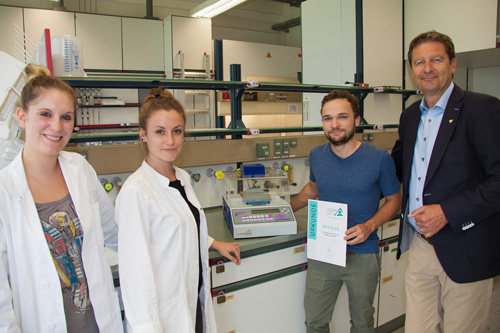
September 2017
The Labexchange Foundation is supporting students with the development of a biological pipe cleaner. On behalf of the Labexchange Foundation, Dr Wolfgang Kuster handed over a donation of a Stratagene Robocycler 96 to the project team at the University of Stuttgart.
Georg Singer wrote in his e-mail to Labexchange, “it would be absolutely fantastic and make things a lot easier for our team if Labexchange were to fund this device for us!” On behalf of a group of 10 students from the University of Stuttgart, Singer asked for support with participation in the largest international student competition in the field of biotechnology. The “international genetically engineered machine” competition (iGEM) seeks to bring together and promote the fields of synthetic biology, bioinformatics and systems biology. This interdisciplinary contest was initiated by MIT (Massachusetts Institute of Technology) in 2004. The University of Stuttgart is taking part in the competition for the first time.
By “this device”, Singer was referring to a second-hand Stratagene Robocycler 96 worth € 1,250. The students needed a PCR cycler, provided by the Labexchange Foundation, for their “LIGHT UP THE PIPE” project. The research team presented its project on the occasion of the hand-over of the donation by the foundation's founder Dr Wolfgang Kuster.
The students have set themselves the task of developing a biological pipe cleaner based on the use of enzymes. For this reason, the biological pipe cleaner has to be more environmentally friendly than chemical cleaners used to date. The emphasis lies on the degradation of waste matter containing keratin, such as hair, soap residue and fat particles. As part of their project, the students want to develop a biobrick containing keratinase, lipase and esterase and combine these in such a way that contamination and waste of this kind can be sustainably degraded using biotechnological means.
The dedication and ambition invested by the students in their non-profit research project means they are making a positive contribution to environmental protection. The sponsorship of such innovative ideas, which take into account ecology and sustainability, is a cause which is particularly close to the heart of the Labexchange Foundation.
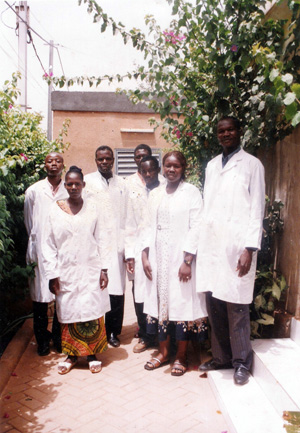
May 2017
The Labexchange Foundation – Wolfgang-Kuster-Stiftung has donated a Siemens Advia 120 haematology analyser to the St Marcel non-profit outpatient clinic in Burkina Faso. The analysis device embarked on its journey to Africa back in March. Now on site, it is playing its part in reducing infant mortality.
The head of the clinic, Dr med Albert Compaore, approached Labexchange at the beginning of the year, asking for support in the form of a haematology analyser for the St Marcel community outpatient clinic in Zinairé.
Zinairé is located approximately 40 km east of the capital, Ouagadougou. It has a population of 30,000. The majority of its inhabitants are poor farmers who lack food and adequate medical care. Malaria and Aids, parasitic diseases and anaemia are the main diseases which characterise day-to-day medical care at the clinic. Chronic anaemia means that the rate of infant mortality is very high. In order to contribute to a reduction in infant mortality, it is necessary to perform systematic, preventive blood count analysis of children. This enables early diagnosis and the start of therapy.
To carry out its valuable work, the clinic required a haematology analyser for this vital blood count analysis. Labexchange – Die Laborgerätebörse provided the urgently needed device and donated a Siemens Advia 120 haematology analyser worth 7500 euros to the Labexchange Foundation for use in a range of different blood analyses. The high-quality analysis device was brought to a collection point operated by the haulier Spedition Denkinger in Ehingen. From there, it embarked on its journey to Africa in March.
Each day, around 100 analyses are carried out at the clinic’s rudimentarily equipped laboratory. In times of epidemic, this number can be as high as 200 ‒ and rising. Since inhabitants of the surrounding villages now also come to the St Marcel outpatient clinic for treatment, the capacity of the laboratory is quickly exhausted – a further reason why the Siemens Advia 120 is so desperately needed. The promotion of medical care in poorer countries, as well as support for such institutions, are causes which are particularly close to the heart of the Labexchange Foundation.
The clinic is operated by the Omnia Pro Medico organisation, which was also founded by Dr Compaore. He received his medical training at the Karl Marx University in Leipzig and the Albert Einstein University in Ulm. The clinic serves exclusively charitable purposes and is financed by donations, external funds and its own economic activities. The clinic covers a broad care spectrum, from general health care, awareness programmes, the treatment of leprosy, tuberculosis, malaria and Aids patients to the treatment of kidney disease and performance of haemodialysis.
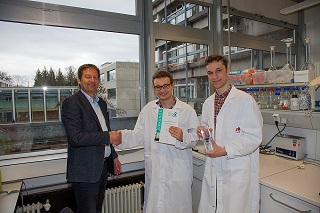
Tiny plants with huge potential
March 2017
Two Heidelberg students proudly received their Labexchange Award at their laboratory. The Labexchange Foundation awarded them the prize for their impressive research work, undertaken on their own initiative, on the use of duckweed as a "phosphate recycler".
Many interesting projects were submitted for consideration to the Labexchange Foundation – Wolfgang-Kuster-Stiftung. At the end of the required selection process, the winners were announced: They are students Johann Liebeton and Leon Werner for their duckweed research project.
It was clear from the submitted documentation that the research was concerned with a highly topical issue and was therefore extremely interesting. To take a look at the research project for himself, the foundation's founder Dr Wolfgang Kuster visited the winners' laboratory in Heidelberg. Highly impressed by the students' work and results, he presented them with the Labexchange Award. The award is linked to support in the form of provision of laboratory equipment and furnishings. In order to successfully pursue their research work, the students require additional equipment which will be provided by the Labexchange Foundation.
"Johann Liebeton and Leon Werner's project is a logical choice for the Labexchange Award, as it honours the research work by these young students which they began while still at school and which they are carrying out on their own initiative," Dr Wolfgang Kuster explains.
The young scientists have been looking into the biological recycling of phosphates from surface water and the establishment of a sustainable phosphate cycle. The increased use of fertilizers in agriculture has led to the severe pollution of surface water by phosphate salts. By means of laboratory experiments, the young researchers were able to prove that duckweed is ideally suited to phosphate recycling. They proved that these tiny water plants efficiently bind phosphate, nitrate and potassium ions. Duckweed therefore reduces the increased concentration of phosphate salts in surface waters by ecologically sound means. The young researchers also discovered that duckweed is an excellent source of biogas and, furthermore, can even be used as a natural fertilizer.
Under the banner "Tiny plants with huge potential", this research project and its results are a prime example of how to strike a balance between modern agriculture, sustainable energy generation and environmental protection. The Labexchange Award was created to acknowledge this kind of innovative scientific insight, which serves the common good and the protection of the environment.
In 2014, to mark the 25th anniversary of Labexchange - Die Laborgerätebörse, Wolfgang Kuster set up the Labexchange Foundation - Wolfgang-Kuster-Stiftung. This is a charitable foundation which is dedicated in particular to the promotion of healthcare, art and culture, environmental protection, the welfare system and the common good. Support takes the form of both financial resources and the provision of diagnostic and analytic laboratory equipment and furnishings free of charge. The foundation offers regular support to social projects and presents the annual Labexchange Award.
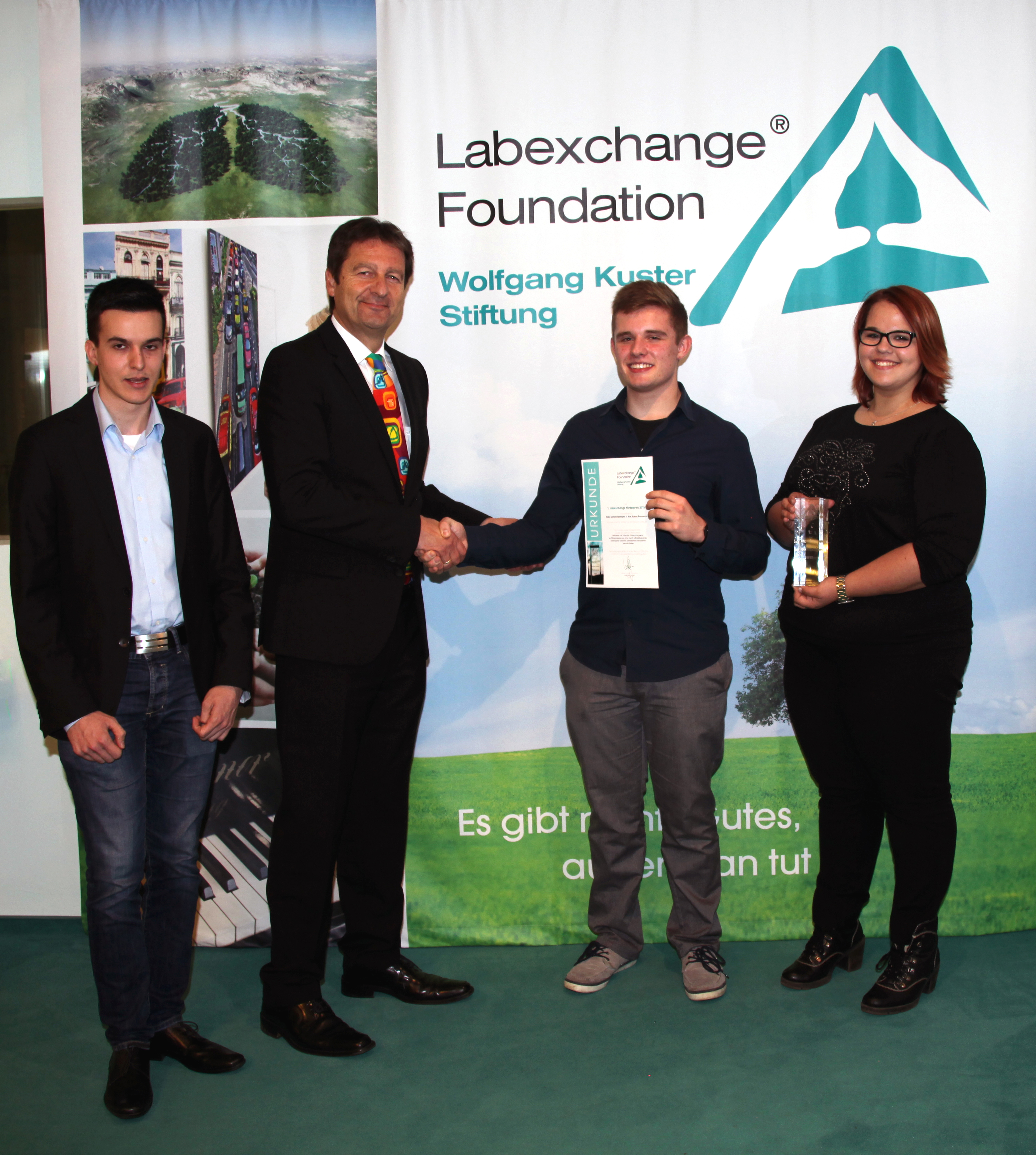
November 2015
As part of a festive award ceremony of the Labexchange Foundation - Wolfgang-Kuster-Stiftung, the first Labexchange promotion prize was awarded to two students, who are active in the club "Researchers for the region" the 26th November in Burladingen. The students have received the prize for their outstanding activities in the field of a bacteria-powered fuel cell.
Right after class, the students took the 130km trip to Burladingen. Not only to accept the declared promotion award, but also to present their project to the attendees. The award, doped with 3.500,_ Euro was handed over by the founder Wolfgang Kuster to the students who have participated in this project with an especial like. The young scientists made a wish for a laboratory fume hood in order to continue their research in the student research centre in Ohlsbach. A suitable fume hood was chosen immediately from the wide assortment of Labexchange.
The founder and managing director of Labexchange - Die Laborgerätebörse GmbH, Wolfgang Kuster, appreciated the students in his laudation for their scientific commitment in the scope of renewable energies. Daniel Heid, vice-chairman of Researchers for the region e.V., also spoke a few words and expressed his thanks on behalf of the association, whose propose is the promotion science, research and education, for this award.
The choice of the scientific project "bacteria with potential", in which the possibility for energy production and water purification by sulphide depleting, electrophilic bacteria is investigated, was stated a reason by the founder with its "inestimable importance for the humanity, focusing on renewable energies and to explore new ways aloof of fossil fuels. The students have extended the knowledge of usable alternatives of energy supply and thus contributed the common weal."
"Findings on alternatives to oil, coal and greenhouse gases have increased enormously in the past decade, thanks to the intense international research efforts. Today it is undisputed all over the world, that the future lies in renewable energies and that the human, with its unprecedented exploitation of natural resources, is primarily responsible prospective trend. In an era, in which resources are becoming increasingly scarce, reconditioning, recycling and proper disposal are thus important tasks of our society", Kuster continued.
This is not the first award, the young researches have received for their work, but certainly something very special, as it has been created specifically for innovative scientific findings, serving the common weal and now has been bestowed for the first time by the Labexchange Foundation - Wolfgang-Kuster-Stiftung.
Wolfgang Kuster has established the Labexchange Foundation-Wolfgang-Kuster-Stiftung by reason of the 25th anniversary of the company Labexchange in 2014. It is a non-profit foundation, which is especially dedicated to the promotion of health care, arts, environment, the welfare system and the common weal. The promotions are provided through funds or through the free allocation of medical, analytical or clinical-chemical laboratory systems and laboratory equipment. For some considerable time, Labexchange-Die Laborgerätebörse GmbH is donating a fraction of each sold new or used laboratory device to the Labexchange Foundation, which is using the amount charitably to promote ecology and sustainability. In future, the foundation will regularly support social projects and award the Labexchange prize to charitable projects.
Labexchange - Die Laborgerätebörse GmbH assumes corporate responsibility for social interests and started, in 2012 for the first time, to promote projects, which pursue directly charitable purposes.
As first project, the development of a hospital in Cameroun was selected, which is supported by the working group Humanitäre Hilfe e.V., domiciled in the Hospital Landsberg am Lech.
In the hospital of Ndoungue mainly the poorest of the poor are treated. In order to be able to make a life-saving diagnosis, Labexchange donated the urgently needed laboratory and analytical equipment to Cameroun.
A blood centrifuge, a refrigerator for heat sensitive samples, as well as some pipettes now allow the medical staff on site, to examine samples, to provide clear diagnoses and thus to perform the right medical treatment. Without these functional, modern and durable devices the work in the laboratory is much more time-consuming or not to make and a correct treatment is hardly possible.
At the beginning of the year 2012, when the hospital should be rebuilt, there was a lack of bare necessities. Medical personnel, medical devices, sanitation and last but not least a well-equipped laboratory was missing.
The laboratory has a relatively broad spectrum of analysis. Both the most important clinical chemistry tests and blood counts, microscopic urogenital and stool tests, the production of parasites and malaria preparations, tuberculosis evidence and bacteriological cultures are part of the repertoire here.
The hospital „Protestant de Ndoungue „ is located between Bafoussam and Douala, an approximately 3 hour’s drive away from the Cameroonian economic metropolis Douala, in the region Littoral. The hospital with 213 beds was established in 1906 by the Basel Mission. Humanitäre Hilfe e.V. has stood for a long time for the reconstruction of this hospital. The association consists of doctors and healthcare professionals of the hospital in Landsberg am Lech, who bundle their commitment to people in need around the world in common projects. The alleviation of poverty, the preservation of a healthy nature and environment, the promotion of the common good and human values, the promotion of development aid and health, the support of people in need, the support of social and charitable purposes and the support of institutions, which take care of people in poorer countries, all these are supporting pillars of our society, for which Labexchange also stands for now. Promoting health care and sustainable use of resources at home and abroad are of particular importance to Labexchange.
